MIKE
TIANO: How did the TRUE YOU TRUE ME project come about?
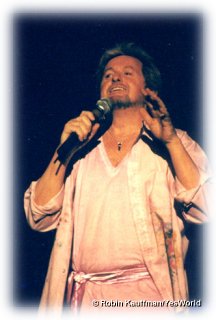 JON ANDERSON:
We started working together in Vancouver when we were still recording
THE LADDER. But the first time we actually worked together was in South America on the first tour. I found that it was... JON ANDERSON:
We started working together in Vancouver when we were still recording
THE LADDER. But the first time we actually worked together was in South America on the first tour. I found that it was...
IGOR
KHOROSHEV:
Very bad (laughs).
JA: ...perfect timing to spend an afternoon with a keyboard and Igor and just see what we were like together, you know, it was like playing tennis or playing a game. Very much my belief in the Glass Bead Game, that two people can create great music if they're both relaxed and invite the musical angels, or the musical energies, and bring them forth. We tried that in South America and it was okay, then we tried it in Vancouver, it was pretty okay. We still hadn't found...
IK:
It was never okay...it was bad.
JA:
We'd never found the key. But then we were in Europe, in England. We had an afternoon in Nottingham and we found the key about how to work together, which is pretty simple. We have musical, pieces of music but we just sort of jump together with it. We sort of get on the trampoline and really musically jump around. Then we just spent two weeks in SLO and we just wrote very, very instantly. There was no --we'd already taken away the potential problems of how to work together, so to make music was the simplest thing. It just came out so fast and wonderful and furious and beautiful.
MOT: You basically laid down the foundation and it kind of flowed from there.
JA:
Yeah, we got rid of how not to make music together. We tried doing chanting and vision-scope music and it didn't work--it worked but it wasn't good. But then we just found a way of being able to be spontaneous together.
MOT: So how do you characterize the music that you made on this project?
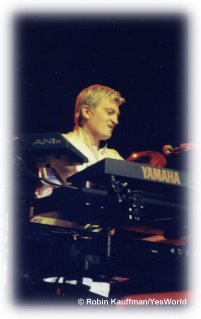 IK: Very, very symphonic. We're pretty sure that it's going to include a symphony orchestra; we don't know how many pieces yet. But, it will include a symphony orchestra, it will include a children's choir and a mixed choir, male/female choir. Compositions last sometimes for 20 minutes, sometimes for 12 minutes, it depends. But it's basically all one piece, and it sounds like a musical, pretty much. Like a Broadway play, only it's not because Jon participated in
its writing so much...there is so much of him in there, and there is so much of what I always wanted to do, where I wanted to expand it and go to the new horizons. I'll tell you one thing, it's not a pop record at all. It has nothing to do with pop. IK: Very, very symphonic. We're pretty sure that it's going to include a symphony orchestra; we don't know how many pieces yet. But, it will include a symphony orchestra, it will include a children's choir and a mixed choir, male/female choir. Compositions last sometimes for 20 minutes, sometimes for 12 minutes, it depends. But it's basically all one piece, and it sounds like a musical, pretty much. Like a Broadway play, only it's not because Jon participated in
its writing so much...there is so much of him in there, and there is so much of what I always wanted to do, where I wanted to expand it and go to the new horizons. I'll tell you one thing, it's not a pop record at all. It has nothing to do with pop.
JA:
It's like a tone poem. It's the nearest thing I can think, it's a symphonic tone poem. The poetry is sort of semi-autobiographical storytelling, but the music is also... it worked both ways, you do the song and then the music tells the story, it's like Igor will play the song after I've sang it, it's that kind of idea. Like Igor says, a little theatre thing going on. We talked about it as we were making the music, we said, this will be good on stage, this idea will work on stage, because we want to do it on stage.
MOT: Would you say that it is almost conceptual in nature, that's what I'm kind of getting from the theatrical angle.
IK:
Absolutely.
JA:
Yeah.
IK:
It's a two-people play, basically.
MOT: So themes and melodies may appear in other sections of the album...
JA:
All the time.
IK:
Absolutely. If you're talking about theatre presentation I wouldn't be surprised if he would be laying in bed covered with blankets while I'm sweeping the floor when the orchestra is playing something. You can imagine so many different things that might happen when we go out there actually and do it live. Which I'm very excited about, to be honest.
MOT: Are you the only two musicians on this project?
JA:
Well, we are the basic basis of the music, so the idea is we can go on tour and just be two people on stage. But we're going to add orchestra and chorus on various parts because we feel it could handle it, it'll sound good. That's just for the record,. But for doing the show on tour, it's just the two of us.
IK:
We don't know. We might incorporate local orchestras around the world. It depends on so many things. We're getting into the business part of it, which is not what it's all about.
MOT: But on the project itself, it's just you two. You didn't bring in a drummer play parts or do anything like that.
JA:
No, no...
IK:
No, we don't need that. No bass players, no drummers, no guitar players. I wouldn't mind having Steve Howe winkling away, but he is going to be too busy performing on his live shows.
JA:
Solo work.
MOT: On his cruise.
IK:
On his cruise ship, yeah. He'll be too busy for this.
MOT: Is there an overall concept to the album?
JA:
No, I said it's again semi-autobiographical, yet a lot of
interaction between the two of us. I didn't just write a bunch of songs and he's playing keyboards. We interact with each other, spontaneously.
IK:
He will sing a line and I'll just go on a rampage, crazy. As I went and did it he laughed and said "this is enough" and we would come in and we would continue with the song, and sing the song that he would come into the room with. But the majority of this music was extremely spontaneous. Most of the time we drank, cooked, and ate, and went to the beach, and dedicated maybe a couple hours a day to just, to this. And I still don't understand how we pulled it off, doing it for two weeks and having somewhere around an hour of music of that caliber, is beyond belief. We spent three months with Yes, five people, to do
THE LADDER, and only two weeks for us to do this. It was magic, pretty much.
MOT: It sounds like fun is the key word here. As you said Jon, you relax and it comes out naturally.
JA:
Yeah, we knew we could make some good music, and it's just a question of finding the time to do it, and just go ahead and do it. Then, look back two weeks later at what you'd done, and with a big smile, you say this is really, really good!
IK: (laughs)
JA:
This has been really worth the time together because we just feel that we can work together, we can travel, and we can tour together. These are elements that want us to be like a duo.
MOT: You two are obviously good friends. You get along very well. It sounds like it's a totally collaborative venture here. As you said, it's not just you giving a bunch of tunes to Igor and vice-versa, having you sing on some of his stuff.
JA:
Right.
IK:
Well actually he came into the room with very many ideas that were brought to the level of being not just ideas but songs. But overall we went so much beyond that. I don't even remember how they originally sounded, I just remember how they sounded after we were done with them.
JA:
The idea is that in an afternoon, you can put together five minutes of music, and every afternoon you put together another five minutes and it joins together as like a jigsaw puzzle.
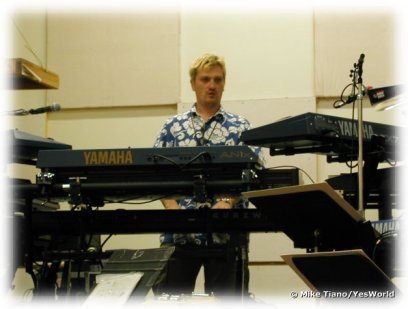 IK: Exactly. Then the melodies start to appear and if he would sing the first melody that is a major melody in major then it will kind of intervene into the melody that will be somewhere like an echo but it will be in minor, and he would sing an absolutely different song that will appear later as a main piece. It's a
never ending story when once you listen to it from the beginning to the end you realize the whole concept. And of course the end is epic. It's almost like "Awaken" when it climbs up to the point of beyond belief, and only when you think, "okay, this is it, I can't take it anymore", it just gets so much bigger. That's where we need the orchestra and the choir to make it happen, to get the real thing. But it was a very fun experience, for me personally, I felt like it was the only experience in my life that I had, writing-wise, with somebody. Very, very beneficial for my own ego as a musician. IK: Exactly. Then the melodies start to appear and if he would sing the first melody that is a major melody in major then it will kind of intervene into the melody that will be somewhere like an echo but it will be in minor, and he would sing an absolutely different song that will appear later as a main piece. It's a
never ending story when once you listen to it from the beginning to the end you realize the whole concept. And of course the end is epic. It's almost like "Awaken" when it climbs up to the point of beyond belief, and only when you think, "okay, this is it, I can't take it anymore", it just gets so much bigger. That's where we need the orchestra and the choir to make it happen, to get the real thing. But it was a very fun experience, for me personally, I felt like it was the only experience in my life that I had, writing-wise, with somebody. Very, very beneficial for my own ego as a musician.
MOT: It certainly sounds exciting from the way you've described it. I remember you were characterizing it as almost like Yes music.
IK:
Well, you will always have a little bit of this here and there, because it's Jon Anderson--he co-wrote the majority of Yes music. He is a great influence on what Yes music is. You can't take it away from him so therefore, of course you will hear some of it on this album, absolutely.
JA: It will be an ongoing situation that as I've said, probably by next summer, people will get what it is. They'll get the music, then they've got to get the stories and then the interwoven messages, and the interplay in numerology. It's got a lot to do in numerology. And then, figuratively speaking, by next summer, they'll have the answers to a lot of questions that are posed in the piece.
IK:
They're going to have the music of it, and they're going to have a package in November.
JA:
And a then a booklet. By next, say, May, they'll be getting the visual of it. It's not just an album of music. It's an album of music, then a booklet of information, the story, the interwoven relationships. We have many past-life experiences and this is what's part of the music, and it's all to do with numerology and the fact that by next spring there will be a visual experience of the music, which is something as you know I've been wanting to do for ten years. Music should be a visual experience as well as a musical experience. I reckon by next spring the reprint of the CD with the visual art will come out. Then, by next summer, we'll be touring with the visual art on stage, then all the story will unfold. We'll have probably done an earlier tour to test the waters, maybe in February or March, something like that. Sometime next year we'll be touring with just two people, but with a visual experience surrounding us that people have never seen before.
IK:
We will become secondary to what's going on on the stage.
JA:
Not all of the time, but a lot of the time...(all laugh) A lot of the time, your fixation will be on the visual experience you're going through, and then the song, and the lyric, and then me singing and Igor playing. But then you'll go back to the visual experience that you're going through, which is a lot to do with your chakra energies. This is again, something that I've been working on over ten years.
MOT: To where music and visual become as one...
JA:
To make another extension, yeah...
IK:
The definition on the screen of visual that you're going to see on the live show is so high. It's much higher than if you would go and see the movie...
JA:
The IMAX... it's kind of an IMAX 3D presentation
IK:
It's a 3D presentation where he can actually take the light from the screen and throw it somewhere else, you see...
JA:
Can't give it away!
IK:
Aaah!
MOT: I take it that both of you will dictate the visual form of how it will look.
JA:
Yeah, we're already working with somebody who has created a new way of computer visualization, and that's working great. We've been in discussion with them on how we're going to present it. As I said to you, it's a sort of seven step thing. First of all we're going to send out bites of the album , free, probably around October, 10 second, 20 second bites. Then people can build their own little pieces of music if they wanted to. People are doing this a lot. The next step will be promoting the album. The album will come out, then the booklet with the album. Then the visualization of the album and the presentation on stage of the stories and how they all interrelate. And then on the seventh opening of the idea you'll be able to witness the event. That's the idea, it's a seven step process.
MOT: What comes to mind when you mention that is DVD because on DVD you can do a lot of that intermixing as it were. I think PET SOUNDS, the Beach Boys album ... I don't know if they ever did it but at one time Brian Wilson just wanted to put it all out there. Here it all is. You mix it yourself.
JA:
Here's the mixes, you mix it yourself, I agree. Well Igor is going to get working with Cakewalk, is it?
IK:
Yeah, well, I don't know. Majority of the people, seems to me, have IBM's in our times, and there is a company that's called Cakewalk that does this software shareware program for both
Macintosh and IBM, so that way more people would be exposed to the game itself and more people would be exposed to all the MIDI files they can create and all the numbers of the measures in which he will sing a certain line that would mean something. It's a puzzle. It's a game. They will have to figure out the answer, and the winners will get...Very special things.
MOT: A Maytag washer! (all laugh)
IK:
It's going to be something very special.
MOT: I have just one last question, not really about music itself, but I take it you probably feel liberated by the whole advent of the
Internet. These issues with Napster and such aside, here you create exactly what you want to create without kow-towing to the lowest common denominator.
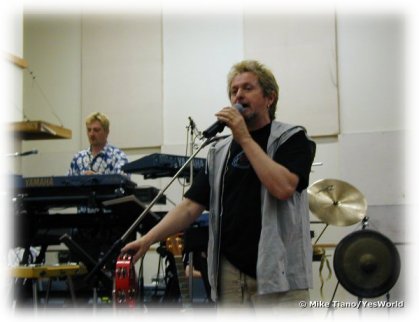 JA:
Right. It's always been a problem, and we've just had virtually 10, 15 years of being chained to the business. See, the biggest problem that the music business has, it forgets that without musicians it hasn't got a fucking business. And they tend to control and slave, like Prince went through the slavery of the musician, by setting them up with tons of money or whatever they want to do . Musicians are just these guys that want to make music. Okay, they want to have a wonderful lifestyle, but the majority just want to make really great music, and they're constantly being told what kind of music to make. Individuals can do what they want to do, but when you're working in a group situation it's always very, very difficult to, as a group, dignify music. Most of the time you're bowing to the almighty dollar. Record companies, your accountants, and your managers don't understand why you're even making music, they're just there for the business. But they wouldn't have a business but for the musician. It's a catch-22. Thank God for the new world. Thank God for computers. JA:
Right. It's always been a problem, and we've just had virtually 10, 15 years of being chained to the business. See, the biggest problem that the music business has, it forgets that without musicians it hasn't got a fucking business. And they tend to control and slave, like Prince went through the slavery of the musician, by setting them up with tons of money or whatever they want to do . Musicians are just these guys that want to make music. Okay, they want to have a wonderful lifestyle, but the majority just want to make really great music, and they're constantly being told what kind of music to make. Individuals can do what they want to do, but when you're working in a group situation it's always very, very difficult to, as a group, dignify music. Most of the time you're bowing to the almighty dollar. Record companies, your accountants, and your managers don't understand why you're even making music, they're just there for the business. But they wouldn't have a business but for the musician. It's a catch-22. Thank God for the new world. Thank God for computers.
IK:
But that's evolution too. We don't know who's going to survive... the record company might survive. If they do everything right...and they might survive. Or we might die, or we might survive, but what will always live is music, regardless to who owns the rights to it. Music will always be there. But I agree with Jon, thank God for computers. Now we can deliver our music straight from our hearts to the people. They will listen to it all the time, their children will listen to it.
JA:
You can go to your Yes radio station, your Yes TV station...fun and games.
MOT: Are you selling this, at this point, only through the Internet?
JA:
Yeah, but it's two seconds away from global connecting, TV monitors... we're a fraction away from linking them together completely.
MOT: That's true.
JA:
We've just got to get AT&T to merge with Microsoft , and there you go.
MOT: To where you have one entertainment/information center...
IK:
Exactly.
JA:
Yes. It's happening very quickly. Like Seagram just became one of the biggest conglomerates. They own Polygram, they own... all out of whiskey. My God. They've got billions upon billions. So we're getting down to the final dozen corporate energies that control the world, if you remember Network, the movie. It's the same principle.
MOT: Mad as hell, ain't gonna take it no more.
IK:
We're just two poor white folks just trying to write some music.
JA:
Yeah. The key to what we want to do is that we love working together. We love the idea of just being on stage together, as you know when we did
THE LADDER tour, there were little instances when we were just together... the end of "Homeworld". Little vignettes. The end of "Homeworld" was a song we wrote in South America two years ago when we first met. So there were little vignettes where we know the music we've been making when it didn't really work is still very useful, still very interesting music. This project was a sort of bonding of what we wanted to do. Part of that will be playing opera houses of the world... first class.
IK:
I agree.
JA:
That's been my dream for years.
MOT: So is there a target release date for this?
JA:
By the end of the year, that's for sure.
IK:
November, something like that. So they have enough time to get it for Christmas. |
 This
fall Jon and Igor will release their collaboration TRUE YOU TRUE ME on
CD, initially for sale only via the Internet. The two were eager to
talk about their first project together outside of Yes, and their
enthusiasm for this seemingly malleable creation promises a unique
experience. They are taking orders in advance for TRUE YOU TRUE ME at
the URL below. The first 1000 people to purchase the CD when it's available will
receive their copy personally autographed by Jon and Igor, and be
eligible to win random drawings for free tickets and backstage passes to
a Yes concert on a future tour.
This
fall Jon and Igor will release their collaboration TRUE YOU TRUE ME on
CD, initially for sale only via the Internet. The two were eager to
talk about their first project together outside of Yes, and their
enthusiasm for this seemingly malleable creation promises a unique
experience. They are taking orders in advance for TRUE YOU TRUE ME at
the URL below. The first 1000 people to purchase the CD when it's available will
receive their copy personally autographed by Jon and Igor, and be
eligible to win random drawings for free tickets and backstage passes to
a Yes concert on a future tour.


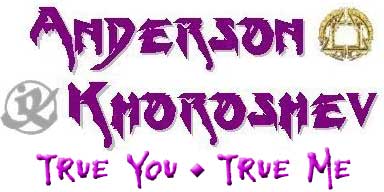
 JON ANDERSON:
We started working together in Vancouver when we were still recording
THE LADDER. But the first time we actually worked together was in South America on the first tour. I found that it was...
JON ANDERSON:
We started working together in Vancouver when we were still recording
THE LADDER. But the first time we actually worked together was in South America on the first tour. I found that it was... IK: Very, very symphonic. We're pretty sure that it's going to include a symphony orchestra; we don't know how many pieces yet. But, it will include a symphony orchestra, it will include a children's choir and a mixed choir, male/female choir. Compositions last sometimes for 20 minutes, sometimes for 12 minutes, it depends. But it's basically all one piece, and it sounds like a musical, pretty much. Like a Broadway play, only it's not because Jon participated in
its writing so much...there is so much of him in there, and there is so much of what I always wanted to do, where I wanted to expand it and go to the new horizons. I'll tell you one thing, it's not a pop record at all. It has nothing to do with pop.
IK: Very, very symphonic. We're pretty sure that it's going to include a symphony orchestra; we don't know how many pieces yet. But, it will include a symphony orchestra, it will include a children's choir and a mixed choir, male/female choir. Compositions last sometimes for 20 minutes, sometimes for 12 minutes, it depends. But it's basically all one piece, and it sounds like a musical, pretty much. Like a Broadway play, only it's not because Jon participated in
its writing so much...there is so much of him in there, and there is so much of what I always wanted to do, where I wanted to expand it and go to the new horizons. I'll tell you one thing, it's not a pop record at all. It has nothing to do with pop. IK: Exactly. Then the melodies start to appear and if he would sing the first melody that is a major melody in major then it will kind of intervene into the melody that will be somewhere like an echo but it will be in minor, and he would sing an absolutely different song that will appear later as a main piece. It's a
never ending story when once you listen to it from the beginning to the end you realize the whole concept. And of course the end is epic. It's almost like "Awaken" when it climbs up to the point of beyond belief, and only when you think, "okay, this is it, I can't take it anymore", it just gets so much bigger. That's where we need the orchestra and the choir to make it happen, to get the real thing. But it was a very fun experience, for me personally, I felt like it was the only experience in my life that I had, writing-wise, with somebody. Very, very beneficial for my own ego as a musician.
IK: Exactly. Then the melodies start to appear and if he would sing the first melody that is a major melody in major then it will kind of intervene into the melody that will be somewhere like an echo but it will be in minor, and he would sing an absolutely different song that will appear later as a main piece. It's a
never ending story when once you listen to it from the beginning to the end you realize the whole concept. And of course the end is epic. It's almost like "Awaken" when it climbs up to the point of beyond belief, and only when you think, "okay, this is it, I can't take it anymore", it just gets so much bigger. That's where we need the orchestra and the choir to make it happen, to get the real thing. But it was a very fun experience, for me personally, I felt like it was the only experience in my life that I had, writing-wise, with somebody. Very, very beneficial for my own ego as a musician.  JA:
Right. It's always been a problem, and we've just had virtually 10, 15 years of being chained to the business. See, the biggest problem that the music business has, it forgets that without musicians it hasn't got a fucking business. And they tend to control and slave, like Prince went through the slavery of the musician, by setting them up with tons of money or whatever they want to do . Musicians are just these guys that want to make music. Okay, they want to have a wonderful lifestyle, but the majority just want to make really great music, and they're constantly being told what kind of music to make. Individuals can do what they want to do, but when you're working in a group situation it's always very, very difficult to, as a group, dignify music. Most of the time you're bowing to the almighty dollar. Record companies, your accountants, and your managers don't understand why you're even making music, they're just there for the business. But they wouldn't have a business but for the musician. It's a catch-22. Thank God for the new world. Thank God for computers.
JA:
Right. It's always been a problem, and we've just had virtually 10, 15 years of being chained to the business. See, the biggest problem that the music business has, it forgets that without musicians it hasn't got a fucking business. And they tend to control and slave, like Prince went through the slavery of the musician, by setting them up with tons of money or whatever they want to do . Musicians are just these guys that want to make music. Okay, they want to have a wonderful lifestyle, but the majority just want to make really great music, and they're constantly being told what kind of music to make. Individuals can do what they want to do, but when you're working in a group situation it's always very, very difficult to, as a group, dignify music. Most of the time you're bowing to the almighty dollar. Record companies, your accountants, and your managers don't understand why you're even making music, they're just there for the business. But they wouldn't have a business but for the musician. It's a catch-22. Thank God for the new world. Thank God for computers.